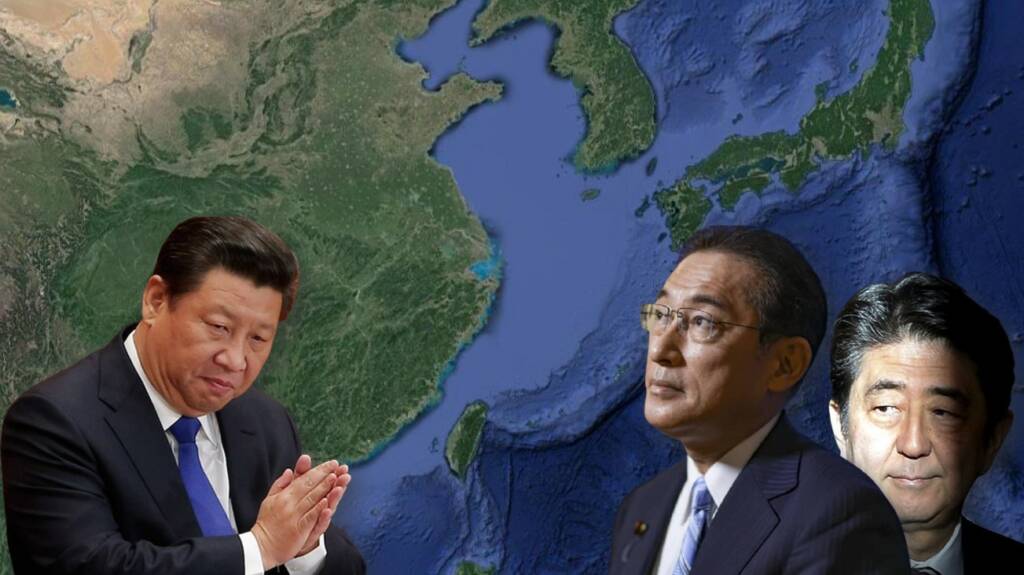The Chinese Communist Party has tried to maintain its image of being an extremely stable government on every metric. However, the Japanese government has started reciprocating to China’s aggressive posturing both in the Taiwan strait as well as in the East China Sea. The government of Fumio Kishida has been following the advice of the ex-Prime Minister of Japan Shinzo Abe verbatim. And as the statements and actions of Tokyo have been nullifying any efforts of adventurism by Beijing, a frustrated Xi Jinping had to extend an offer to establish a defence hotline with Japan.
Interestingly Japanese Defence Minister Nobuo Kishi originally requested talks with Wei in February, but the request fell on deaf ears and CCP paid no heed to it. However, now CCP has come begging for the establishment of the hotline, given it has found its sabre-rattling to be counterproductive. In the midst of tensions over disputed Senkaku Islands in the East China Sea among other things, Japanese Defence Minister Nobuo Kishi announced Monday that he and his Chinese counterpart Wei Fenghe agreed to establish a hotline between their officials.
In addition to this, after a video conference with Wei, Kishi stated at a press conference that peace and stability in the Taiwan Strait are critical for Japan’s security and that Tokyo will closely monitor developments there.
The impact of Japan’s Taiwan offensive
Shinzo Abe is one of the few world leaders who still hold substantial influence with respect to their country’s foreign policy as they did during their term in office. We at TFIGlobal had reported about how Abe-san has accelerated close cooperation between Japan and Taiwan. We have also shed light on how he came to the support of Taiwan’s government after Joe Biden publicly humiliated the Island nation in the Democracy Summit. However, it was Shinzo Abe and the Japanese government which by stepping up their support to Taiwan and offset the damage which Joe Biden’s diplomatic blunder did.
According to Japan’s Kyodo news agency, the US and Japanese forces have drawn out a draft report for a joint operation whenever an emergency with Taiwan erupts. At the first sign of a Taiwan emergency, the US Marine Corps would deploy troops and set up temporary bases on the Nansei island chain, a Japanese archipelago that runs toward Taiwan, according to Kyodo. Meanwhile, the Japanese armed forces would provide logistical support in the form of ammunition and fuel supplies. The fact that this draft has seen the light of the day after Joe Biden humiliated Taiwan, goes on to show how influential Shinzo Abe is.
Shinzo Abe’s direct warning to Xi Jinping has changed the dynamics entirely
On December 1, Abe-san minced no words while issuing an explosive threat of war to Xi Jinping and the CCP. He castigated the Chinese President by taking his name, called him a mere “Secretary” and not President, and warned him of serious economic consequences should the paranoid leader ever think of endangering Taiwan’s sovereignty. Leaving no room for ambiguity and without betraying the emotions of millions of Japanese, Abe-san told Jinping that “Peace is the only option” for China. He said, “A military adventure would be the path to economic suicide. We must keep reiterating that peaceful ties between China and Taiwan are the only option.”
Read more: Shinzo Abe names “Chairman Xi Jinping” and threatens him of dire military consequences
And then there was no stopping Shinzo Abe. He roared, “The emergency in Taiwan is the emergency in Japan. It is also an emergency in the Japan-U.S. alliance. Beijing, especially Chairman Xi Jinping, there must be no misunderstanding about this.” He progressed on to warn China of severe economic consequences if Beijing goes ahead with its Taiwan unification ambitions.
Xi Jinping and the CCP fall inline
These statements followed by military planning as well as strategic manoeuvring have scared Beijing. It is now trying to lower the geopolitical temperatures with Japan. As reported, during their first talks since December last year, which lasted for about two hours, Kishi said the hotline will enhance the efficiency of a communication mechanism that the two countries launched in 2018 to avoid accidental clashes at sea and in the air.
Wei told Kishi, according to the Chinese Defence Ministry, that China will “firmly safeguard its territorial sovereignty as well as maritime rights and interests” over issues surrounding the Senkaku Islands. On the other hand, Kishi said he “strongly demanded” an explanation from Beijing on the contents of China’s new coast guard law, which went into effect on Feb 1 and clearly enables the Chinese coast guard to use weapons against foreign ships it considers to be illegally entering its waters.
The defensive statements by the Chinese side only confirm the immense pressure the CCP and Xi Jinping are in. The Japanese government’s unrelenting support for Taiwan and its actions which are even forcing the US to follow Tokyo’s lead has changed the fortunes of Communist China. And as it finds itself not able to respond to Japan’s Taiwan offensive, Xi Jinping has agreed to set up a defence hotline.
